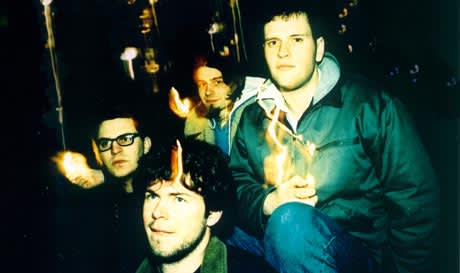It took less than a year for Halifax quartet Wintersleep to morph from experimental side project into one of the city's biggest draws. After a handful of high-profile opening slots for Ron Sexsmith, Sam Roberts and Broken Social Scene, the band was selling out every room in town.
In a region coasting on a decade's worth of New Seattle buzz, with its fabled, mostly lost record deals and ironic hairstyles, that a four-piece with roots in small town Nova Scotia and the humble hardcore and punk scenes of the city could meld those things together and emerge as one of the most hyped acts in years and sound nothing like Sloan while doing it indicates that Halifax might finally be ready to move on.
Wintersleep, the band's second release (its 2003 debut was also self-titled), could be the album to convert the whole country. More adventurous and expansive than the first some of the vocal arrangements border on choral its effusive epics, restrained ballads and full-on rockers comprise a perfect showcase of the Wintersleep aesthetic: driving, sharp percussion, Tim D'Eon's guitars going from shimmer to shriek in an instant and Paul Murphy's ethereal vocals, which have tightened up and smoothed out considerably since the last full-length.
"If I went back and listened to the first one, there's a list of 20 things I would change right now," says drummer Loel Campbell. "We took a lot more time on this one because we could," adds bassist Jud Haynes. The first album was recorded in an old opera house in the seaside town of Lunenburg, an hour outside the city, while the new one was laid down in two Halifax studios. "In Lunenburg, you had to make your time count, so you might rush through what you're doing," Haynes continues. "You know you only have so many hours. But here it was only five minutes away so we could take our time and keep working it until you get what you were picturing in your head. I think everybody's a lot happier with this record."
In a region coasting on a decade's worth of New Seattle buzz, with its fabled, mostly lost record deals and ironic hairstyles, that a four-piece with roots in small town Nova Scotia and the humble hardcore and punk scenes of the city could meld those things together and emerge as one of the most hyped acts in years and sound nothing like Sloan while doing it indicates that Halifax might finally be ready to move on.
Wintersleep, the band's second release (its 2003 debut was also self-titled), could be the album to convert the whole country. More adventurous and expansive than the first some of the vocal arrangements border on choral its effusive epics, restrained ballads and full-on rockers comprise a perfect showcase of the Wintersleep aesthetic: driving, sharp percussion, Tim D'Eon's guitars going from shimmer to shriek in an instant and Paul Murphy's ethereal vocals, which have tightened up and smoothed out considerably since the last full-length.
"If I went back and listened to the first one, there's a list of 20 things I would change right now," says drummer Loel Campbell. "We took a lot more time on this one because we could," adds bassist Jud Haynes. The first album was recorded in an old opera house in the seaside town of Lunenburg, an hour outside the city, while the new one was laid down in two Halifax studios. "In Lunenburg, you had to make your time count, so you might rush through what you're doing," Haynes continues. "You know you only have so many hours. But here it was only five minutes away so we could take our time and keep working it until you get what you were picturing in your head. I think everybody's a lot happier with this record."
